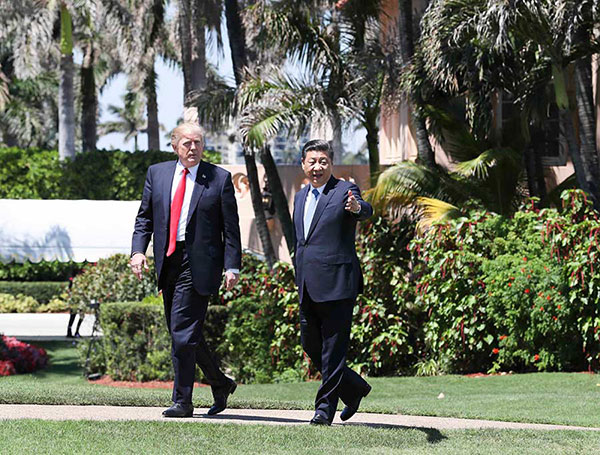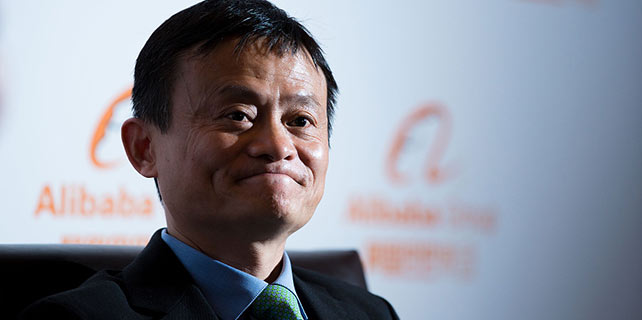Trump warms up to China for greater good
 |
|
President Xi Jinping, right, and his US counterpart Donald Trump take a walk to further discuss bilateral cooperation issues in the Mar-a-Lago resort in Florida, the United States, April 7, 2017. [Photo/Xinhua] |
US President Donald Trump will meet President Xi Jinping in Beijing on Nov 8 during his first state visit to China, which is expected to further enhance the strategic understanding and friendship between the two countries and their heads of state, and hopefully elevate bilateral ties to a new level.
Following the Xi-Trump meeting at Mar-a-Lago, Florida, in April, important breakthroughs have been achieved in Sino-US relations. The meeting established a positive working relationship between the two heads of state, with Trump saying he got on very well with Xi. At their meeting, the two leaders announced that four high-level dialogue mechanisms would be established and a 100-day Action Plan implemented to strengthen bilateral economic ties. The first rounds of dialogue have concluded, yielding the desired results under the 100-day Action Plan, and boosting bilateral relations.
These positive developments reflect two major transformations in Trump's China policy. The first is a shift in his understanding of China from a subjective level to an objective level, and the second, a shift in his policy approach toward China from emotional irrationality to constructive realism. As a result, Trump has transformed from being more hawkish than his predecessor to being friendly. This change has come because of certain factors.
First, better relations with China is conducive to Trump's "America First" policy. China's rapid development over the past 40 years has made it the world's second-largest economy. And China's relationship with the US is the external factor that most affects China's development and security. In particular, the high level of interdependence between the two sides means their interests are inseparable.
According to the American Chamber of Commerce, China-US economic relations have generated about 2.6 million jobs and created a market worth $560 billion for the US. China's huge foreign exchange reserves are mainly in dollars, and it holds more than $1 trillion in US Treasury bonds, which are crucial to maintain the dollar's status as an international currency and balance the US government's budget. Trump's policy of "America First", therefore, won't succeed without China's cooperation.
Second, China has handled relations with the Trump-led US administration rather well. It has pursued a path of peaceful development, breaking the trend of powerful countries vying for hegemony and thus being caught in the "Thucydides trap" that could lead to war. Xi has personally explained Beijing's policy of peace to Trump, emphasizing that China's rise does not pose a challenge to the US or any other country and, instead, it will contribute to mutual development and prosperity. China has also maintained its strategic focus, remaining calm even against Trump's provocative remarks and giving only rational and restrained responses.
Third, Trump needs a political victory. His emphasis on "America First" has led to a range of biased policies, worsening relations with a host of countries, including its traditional allies. Trump's efforts to make breakthroughs with China can thus be seen as an attempt to give a fitting reply to the critiques of his diplomatic policy.
And fourth, Trump is a businessman, not part of the US political establishment. He does not share the same Cold War mentality that some US politicians do, and is perhaps less biased against the idea of China's peaceful rise.
Trump has so far maintained good relations with China. But that does not necessarily mean it will be smooth sailing from now on. The US' investigation to determine whether trade with China has compromised the US' economic and national security, and plans to conduct regular drills in the South China Sea will affect relations between the two sides. And Trump will not fundamentally deviate from the "engage and contain" strategy toward China. But since the factors pushing Trump toward China will not disappear, it is expected that relations between the two countries will be better than they were under his predecessor.
The author is a research Fellow at China Foundation for International Studies.
Source: Chinausfocus.com









